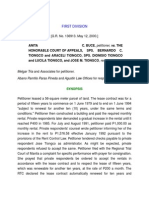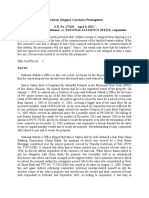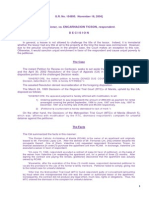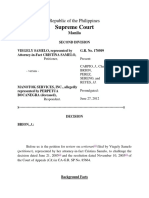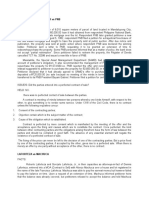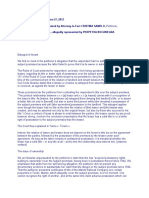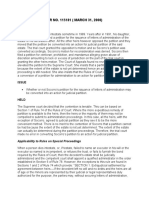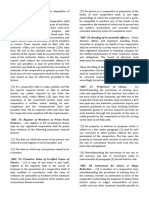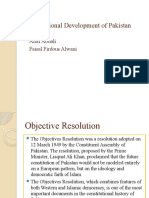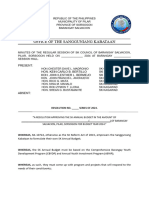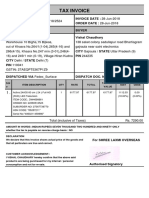0 ratings0% found this document useful (0 votes)
21 viewsViegely Samelo vs. Manotok Services, Inc
Viegely Samelo vs. Manotok Services, Inc
Uploaded by
Prince Calimbo VillaThe document discusses a case between Viegelly Samelo and Manotok Services, Inc. regarding possession of a leased property. Manotok Services claims it rightfully administers the land and leased a portion to Samelo. After the lease expired, Samelo refused to vacate or pay rent. Manotok Services filed an unlawful detainer case, while Samelo claims Manotok has no rights over the land. The court found Manotok Services has better possession rights.
Copyright:
© All Rights Reserved
Available Formats
Download as PDF, TXT or read online from Scribd
Viegely Samelo vs. Manotok Services, Inc
Viegely Samelo vs. Manotok Services, Inc
Uploaded by
Prince Calimbo Villa0 ratings0% found this document useful (0 votes)
21 views5 pagesThe document discusses a case between Viegelly Samelo and Manotok Services, Inc. regarding possession of a leased property. Manotok Services claims it rightfully administers the land and leased a portion to Samelo. After the lease expired, Samelo refused to vacate or pay rent. Manotok Services filed an unlawful detainer case, while Samelo claims Manotok has no rights over the land. The court found Manotok Services has better possession rights.
Original Description:
dasdasdasdw
Original Title
Contracts Pp t
Copyright
© © All Rights Reserved
Available Formats
PDF, TXT or read online from Scribd
Share this document
Did you find this document useful?
Is this content inappropriate?
The document discusses a case between Viegelly Samelo and Manotok Services, Inc. regarding possession of a leased property. Manotok Services claims it rightfully administers the land and leased a portion to Samelo. After the lease expired, Samelo refused to vacate or pay rent. Manotok Services filed an unlawful detainer case, while Samelo claims Manotok has no rights over the land. The court found Manotok Services has better possession rights.
Copyright:
© All Rights Reserved
Available Formats
Download as PDF, TXT or read online from Scribd
Download as pdf or txt
0 ratings0% found this document useful (0 votes)
21 views5 pagesViegely Samelo vs. Manotok Services, Inc
Viegely Samelo vs. Manotok Services, Inc
Uploaded by
Prince Calimbo VillaThe document discusses a case between Viegelly Samelo and Manotok Services, Inc. regarding possession of a leased property. Manotok Services claims it rightfully administers the land and leased a portion to Samelo. After the lease expired, Samelo refused to vacate or pay rent. Manotok Services filed an unlawful detainer case, while Samelo claims Manotok has no rights over the land. The court found Manotok Services has better possession rights.
Copyright:
© All Rights Reserved
Available Formats
Download as PDF, TXT or read online from Scribd
Download as pdf or txt
You are on page 1of 5
VIEGELY SAMELO vs.
MANOTOK SERVICES, INC.
Manotok Services, Inc. (respondent) alleged that it is the administrator of a
parcel of land situated at Tondo, Manila. The respondent entered into a
contract with the petitioner for the lease of a portion of the lot.
The lease contract was for a period of one (1) year, with a monthly rental
of P3,960.00. After the expiration of the lease contract, the petitioner
continued occupying the subject premises without paying the rent. The
respondent, thru its President Rosa Manotok, sent a letter to the petitioner
demanding that she vacate the subject premises and pay compensation
for its use and occupancy but petitioner refused.
The respondent filed a complaint for unlawful detainer against the
petitioner before the Metropolitan Trial Court (MeTC), Manila. In her
answer, the petitioner alleged that the respondent had no right to collect
rentals because the subject premises are located inside the property of
the Philippine National Railways (PNR). She also added that the
respondent had no certificate of title over the subject premises. The
petitioner further claimed that her signature in the contract of lease was
obtained through the respondent’s misrepresentation. She likewise
maintained that she is now the owner of the subject premises as she had
been in possession since 1944.
ISSUE
Who has a better right of possession over the premises
HELD
Respondent has a better right of possession over the subject premises.
"An action for unlawful detainer exists when a person unlawfully withholds possession of
any land or building against or from a lessor, vendor, vendee or other persons, after the
expiration or termination of the right to hold possession, by virtue of any contract, express
or implied." The only issue to be resolved in an unlawful detainer case is physical or
material possession of the property involved, independent of any claim of ownership by
any of the parties involved. Thus, when the relationship of lessor and lessee is established
in an unlawful detainer case, any attempt of the parties to inject the question of
ownership into the case is futile, except insofar as it might throw light on the right of
possession.
Respondent did not give the petitioner a notice to vacate upon the expiration of the
lease contract and the latter continued enjoying the subject premises for more than 15
days, without objection from the respondent. By the inaction of the respondent as lessor,
there can be no inference that it intended to discontinue the lease contract. An implied
new lease was therefore created pursuant to Article 1670 of the Civil Code. Since the rent
was paid on a monthly basis, the period of lease is considered to be from month to
month, in accordance with Article 1687 of the Civil Code.
You might also like
- Sol. Man. Chapter 4 Consol. Fs Part 1Document37 pagesSol. Man. Chapter 4 Consol. Fs Part 1itsmenatoy43% (7)
- Waste Management Scandal 1998Document6 pagesWaste Management Scandal 1998ABNER JUNONo ratings yet
- 11 Lagon vs. Court of AppealsDocument2 pages11 Lagon vs. Court of AppealsJemNo ratings yet
- Unlawful DetainerDocument10 pagesUnlawful DetainerShynnMiñozaNo ratings yet
- Swab ResultDocument1 pageSwab ResultPrince Calimbo VillaNo ratings yet
- Viegely Samelo vs. Manotok Services, Inc.Document1 pageViegely Samelo vs. Manotok Services, Inc.Jillian AsdalaNo ratings yet
- Viegely Samelo, (Petitioner) Versus Manotok Services, Inc., (Respondent)Document7 pagesViegely Samelo, (Petitioner) Versus Manotok Services, Inc., (Respondent)Reina OropillaNo ratings yet
- SAMELO VS. MANOTOK SERVICES, INC. (G.R. No. 170509, June 27, 2012)Document7 pagesSAMELO VS. MANOTOK SERVICES, INC. (G.R. No. 170509, June 27, 2012)Atty Arvin LlegoNo ratings yet
- ZOSIMA Vs SalimbagatDocument4 pagesZOSIMA Vs SalimbagatSheila ManitoNo ratings yet
- Tacita Reconduccion-Implied Renewal On LeaseDocument3 pagesTacita Reconduccion-Implied Renewal On LeaseDuko Alcala EnjambreNo ratings yet
- 7 Buce Vs CaDocument13 pages7 Buce Vs CaEMNo ratings yet
- 2012 - Samelo Vs Manotok Sevices Inc - GR No. 170509 June 27, 2012Document1 page2012 - Samelo Vs Manotok Sevices Inc - GR No. 170509 June 27, 2012Lyka Lim PascuaNo ratings yet
- Unlawful Detainer JurisprudenceDocument70 pagesUnlawful Detainer JurisprudencePen Malubag100% (2)
- Petitioner, Respondents Melgar Tria Associates Abano Pamfilo Paras Pineda Agustin Law OfficesDocument9 pagesPetitioner, Respondents Melgar Tria Associates Abano Pamfilo Paras Pineda Agustin Law OfficesXyrus BucaoNo ratings yet
- Santos V NSO - Case DigestDocument4 pagesSantos V NSO - Case DigestTootsie GuzmaNo ratings yet
- Yuki vs WellingtonDocument2 pagesYuki vs WellingtonNemesio PanugaNo ratings yet
- GABELO V CA Case DigestDocument1 pageGABELO V CA Case DigestMidzmar Kulani50% (2)
- LAGON Vs CA - Torts DigestDocument2 pagesLAGON Vs CA - Torts DigestMaria Raisa Helga Ysaac100% (1)
- Tamio Vs TicsonDocument4 pagesTamio Vs TicsonCel C. CaintaNo ratings yet
- Lagon Vs Ca Torts Digest PDF FreeDocument2 pagesLagon Vs Ca Torts Digest PDF FreeYm TV OfficialNo ratings yet
- 31 Buce vs. Court of AppealsDocument1 page31 Buce vs. Court of AppealsJemNo ratings yet
- Guzman DIGESTDocument5 pagesGuzman DIGESTCarmela SalazarNo ratings yet
- JOSE V. LAGON, Petitioner, Honorable Court of Appeals and Menandro V. Lapuz, Respondents. (G.R. No. 119107. March 18, 2005) Corona, J.: FactsDocument3 pagesJOSE V. LAGON, Petitioner, Honorable Court of Appeals and Menandro V. Lapuz, Respondents. (G.R. No. 119107. March 18, 2005) Corona, J.: FactsJennifer Bautista Hilario100% (1)
- Sulo NG Nayon V Nayong Piipino - DigestDocument2 pagesSulo NG Nayon V Nayong Piipino - DigestFidel Acierto100% (1)
- Unlawful DetainerDocument12 pagesUnlawful DetainerMark Anthony Bueno AsuncionNo ratings yet
- Josefa v. San Buenaventura, GR No. 163429, March 3, 2006Document2 pagesJosefa v. San Buenaventura, GR No. 163429, March 3, 2006Kalvin Chester100% (1)
- 45 Samelo v. ManotokDocument6 pages45 Samelo v. ManotokPaolo Enrino PascualNo ratings yet
- ToleranceDocument2 pagesToleranceswityioraxNo ratings yet
- 01 Dizon V CADocument12 pages01 Dizon V CAKirby HipolitoNo ratings yet
- 20-Enrico Santos v. NSO G.R. No. 171129 April 6, 2011Document7 pages20-Enrico Santos v. NSO G.R. No. 171129 April 6, 2011Jopan SJNo ratings yet
- Mercader v. DBP, GR No. 130699, May 12, 2000Document16 pagesMercader v. DBP, GR No. 130699, May 12, 2000RENGIE GALONo ratings yet
- D 1 G 3 S TDocument4 pagesD 1 G 3 S TBryan BaybayNo ratings yet
- Unlawful Detainer - Demand RequirementDocument3 pagesUnlawful Detainer - Demand RequirementMike SerranoNo ratings yet
- Bukidnon DoctorsDocument2 pagesBukidnon Doctorscmv mendozaNo ratings yet
- Unlawful DetainerDocument8 pagesUnlawful DetainerHowell Alair LabindaoNo ratings yet
- Case Digest Parilla vs. Pilar, G.R. No. 167680, November 30, 2006Document4 pagesCase Digest Parilla vs. Pilar, G.R. No. 167680, November 30, 2006Edel VillanuevaNo ratings yet
- Bentir Vs MeandaDocument2 pagesBentir Vs MeandaAlexis Von TeNo ratings yet
- Gurbax v. Reyes DigestDocument3 pagesGurbax v. Reyes DigestkathrynmaydevezaNo ratings yet
- Tamio vs. TicsonDocument5 pagesTamio vs. TicsonMichiko HakuraNo ratings yet
- Maas Vs Nicolasora PDFDocument3 pagesMaas Vs Nicolasora PDFDianalyn QuitebesNo ratings yet
- MTQ4 MZG 3 Y2 Ztcy 1 K YzgzDocument5 pagesMTQ4 MZG 3 Y2 Ztcy 1 K YzgzKhilji bilalNo ratings yet
- Case Digests in ObliCon (Contracts Only)Document20 pagesCase Digests in ObliCon (Contracts Only)Aly ConcepcionNo ratings yet
- Dizon vs. CA 302 SCRA 288: Sales Cases FULL TEXTDocument58 pagesDizon vs. CA 302 SCRA 288: Sales Cases FULL TEXTCheer SNo ratings yet
- JOSE V. LAGON, Petitioner, vs. HONORABLE COURT OF APPEALS and MENANDRO V. LAPUZ, Respondents.Document2 pagesJOSE V. LAGON, Petitioner, vs. HONORABLE COURT OF APPEALS and MENANDRO V. LAPUZ, Respondents.Charles Roger RayaNo ratings yet
- Samelo vs. Manotok Services Inc..GR No. 170509, June 27,2012 - Law On LeaseDocument10 pagesSamelo vs. Manotok Services Inc..GR No. 170509, June 27,2012 - Law On LeaseNewCovenantChurchNo ratings yet
- Buce v. CA - 332 Scra 151Document2 pagesBuce v. CA - 332 Scra 151alilramonesNo ratings yet
- Gurbax Singh Pabla and Co. vs. Reyes 11111Document2 pagesGurbax Singh Pabla and Co. vs. Reyes 11111Mary Dorothy TalidroNo ratings yet
- MANILA METAL CONTAINER Vs PNBDocument5 pagesMANILA METAL CONTAINER Vs PNBione salveronNo ratings yet
- Artemis JurisprudenceDocument2 pagesArtemis JurisprudenceRab Thomas BartolomeNo ratings yet
- 45 R&M General Merchandise V CADocument4 pages45 R&M General Merchandise V CAGenevieve Kristine ManalacNo ratings yet
- Sales Lease DigestDocument8 pagesSales Lease DigestJoannalyn Libo-onNo ratings yet
- 03 DKC Holdings Corp V CADocument2 pages03 DKC Holdings Corp V CADanielle LimNo ratings yet
- Buce V CADocument2 pagesBuce V CARaymond ChengNo ratings yet
- Felix Gonzales V - ObliconDocument22 pagesFelix Gonzales V - ObliconGuinevere RaymundoNo ratings yet
- A. Preparatory Policitation: Gabelo V Ca FactsDocument22 pagesA. Preparatory Policitation: Gabelo V Ca FactsSam MaulanaNo ratings yet
- 036 - Chua v. IACDocument2 pages036 - Chua v. IACalexis_beaNo ratings yet
- Buce-v-CADocument4 pagesBuce-v-CARobert Jayson UyNo ratings yet
- Petitioners Vs Vs Respondents: First DivisionDocument11 pagesPetitioners Vs Vs Respondents: First DivisionCamille CruzNo ratings yet
- Vda de Chua Vs IACDocument2 pagesVda de Chua Vs IACKelsey Olivar MendozaNo ratings yet
- Muller Vs PNBDocument2 pagesMuller Vs PNBMarklawrence Fortes100% (1)
- Tanay Recreation v. Fausto (2005)Document2 pagesTanay Recreation v. Fausto (2005)King Monteclaro MonterealNo ratings yet
- 03 Digest Kasilag-V-Rodriguez GR No 46623-07dec1939 AlvinLopezDocument2 pages03 Digest Kasilag-V-Rodriguez GR No 46623-07dec1939 AlvinLopezRukmini Dasi Rosemary GuevaraNo ratings yet
- Leave and Licenses in India: A Guide with Helpful Notes and TipsFrom EverandLeave and Licenses in India: A Guide with Helpful Notes and TipsNo ratings yet
- Attendance As of 02.13.2021Document1 pageAttendance As of 02.13.2021Prince Calimbo VillaNo ratings yet
- HEIRS OF PEDRO ALILANO Represented by DAVID ALILANO, Complainants, vs. ATTY. ROBERTO E. EXAMEN, Respondent March 24, 2015 A.C. No. 10132Document3 pagesHEIRS OF PEDRO ALILANO Represented by DAVID ALILANO, Complainants, vs. ATTY. ROBERTO E. EXAMEN, Respondent March 24, 2015 A.C. No. 10132Prince Calimbo VillaNo ratings yet
- In Witness Whereof: Erwin B. TulfoDocument2 pagesIn Witness Whereof: Erwin B. TulfoPrince Calimbo VillaNo ratings yet
- Home Quarantine Request (Villa, Villarin)Document1 pageHome Quarantine Request (Villa, Villarin)Prince Calimbo VillaNo ratings yet
- Villa PrinceAlbert 3rdassignment SpecproDocument24 pagesVilla PrinceAlbert 3rdassignment SpecproPrince Calimbo VillaNo ratings yet
- EssayDocument1 pageEssayPrince Calimbo VillaNo ratings yet
- Certification of Acceptance: Brcy. Ofricu/LsDocument1 pageCertification of Acceptance: Brcy. Ofricu/LsPrince Calimbo VillaNo ratings yet
- RPT Questionnaire To Participating DepartmentsDocument2 pagesRPT Questionnaire To Participating DepartmentsPrince Calimbo VillaNo ratings yet
- Succ VidDocument2 pagesSucc VidPrince Calimbo VillaNo ratings yet
- Home Quarantine RequestDocument1 pageHome Quarantine RequestPrince Calimbo VillaNo ratings yet
- Questions: EssayDocument1 pageQuestions: EssayPrince Calimbo VillaNo ratings yet
- Petitioner-Appellant Vs Vs Oppositor Appellee Perfecto Gabriel Eusebio Orense Camus & DelgadoDocument3 pagesPetitioner-Appellant Vs Vs Oppositor Appellee Perfecto Gabriel Eusebio Orense Camus & DelgadoPrince Calimbo VillaNo ratings yet
- CcomoPArhATIXcUH - JojbAW-UX-oiTxpX-Employee Gambling Policy - Global May 2023 V3.0Document5 pagesCcomoPArhATIXcUH - JojbAW-UX-oiTxpX-Employee Gambling Policy - Global May 2023 V3.0kasuntest364No ratings yet
- Forest Driver NCA-ETB - SL700 - 2021Document2 pagesForest Driver NCA-ETB - SL700 - 2021viraltrendslive123No ratings yet
- Occupational Safety and Health Laws in PakistanDocument3 pagesOccupational Safety and Health Laws in PakistanTufail Shaikh60% (5)
- Assignment of B.S (Ashish Tiwari)Document3 pagesAssignment of B.S (Ashish Tiwari)Shashwat ShuklaNo ratings yet
- Affidavit 1713946574Document21 pagesAffidavit 1713946574Chintu TejaNo ratings yet
- Oct 31, 2022scuTFDocument2 pagesOct 31, 2022scuTFkramergeorgec397No ratings yet
- Ede Chapter 1 PDFDocument25 pagesEde Chapter 1 PDFKunal AhiwaleNo ratings yet
- Creation of New Political Culture in French RevolutionDocument4 pagesCreation of New Political Culture in French RevolutionDhruv Aryan Kundra100% (1)
- RFBT - CooperativesDocument16 pagesRFBT - CooperativesBruegas, Elaiza Rein A.No ratings yet
- Constitutional Development of Pakistan: by Altaf Abuali Faisal Firdous AlwaniDocument16 pagesConstitutional Development of Pakistan: by Altaf Abuali Faisal Firdous AlwaniFarhan RehmanNo ratings yet
- Resolution Approving The Annual Budget SalvacionDocument2 pagesResolution Approving The Annual Budget Salvacionalmaazul1974No ratings yet
- DHSUD@2: DHSUD@2:: Tahanang Ligtas, Abot-Kaya at Matatag, Pamayanang Matiwasay at PanatagDocument17 pagesDHSUD@2: DHSUD@2:: Tahanang Ligtas, Abot-Kaya at Matatag, Pamayanang Matiwasay at PanatagLorenzo Taguinod EsparasNo ratings yet
- PEOPLE vs. ROXAS PDFDocument10 pagesPEOPLE vs. ROXAS PDFPaulNo ratings yet
- Methods of ValuationDocument19 pagesMethods of ValuationRohit KulkarniNo ratings yet
- Debtor Reply To Judge Sean Lane Regarding 081524 Absence FILEDDocument25 pagesDebtor Reply To Judge Sean Lane Regarding 081524 Absence FILEDRahul ManchandaNo ratings yet
- Chapter 16 Test Bank Dissolution and Liquidation of A PartnershipDocument23 pagesChapter 16 Test Bank Dissolution and Liquidation of A Partnershipjosh lunarNo ratings yet
- Frank Pike SengenbergerDocument297 pagesFrank Pike SengenbergerjoaoflitNo ratings yet
- NotesDocument1 pageNotesVishal ChaudharyNo ratings yet
- Vakalatnama Form - 2Document1 pageVakalatnama Form - 2AvinashNo ratings yet
- ScoreDocument3 pagesScoreEliverta FifoNo ratings yet
- VJC Kaleidoscope 2015 General Paper Model EssaysDocument106 pagesVJC Kaleidoscope 2015 General Paper Model Essayssasha g liddleNo ratings yet
- Tenazas V R. Villegas Taxi Transport, G.R. No. 192998, April 02, 2014Document13 pagesTenazas V R. Villegas Taxi Transport, G.R. No. 192998, April 02, 2014Yoo Si JinNo ratings yet
- Mastering Speeding Ticket EbookDocument14 pagesMastering Speeding Ticket EbookRoberto MonterrosaNo ratings yet
- Official Results HunzaDocument37 pagesOfficial Results HunzapamirtimesNo ratings yet
- Thousands Continue Cry For Social Justice...Document4 pagesThousands Continue Cry For Social Justice...Jackson LeydaNo ratings yet
- Experimentul Stanford/ Stanford Prison Experiment: Forensic Science Forum / Forum CriminalisticDocument6 pagesExperimentul Stanford/ Stanford Prison Experiment: Forensic Science Forum / Forum CriminalisticBiancaRusuNo ratings yet
- 7 Why Do We Take SelfiesDocument4 pages7 Why Do We Take SelfiesLayne FeijoNo ratings yet
- Ra 9048 Implementing RulesDocument9 pagesRa 9048 Implementing RulesToffeeNo ratings yet










